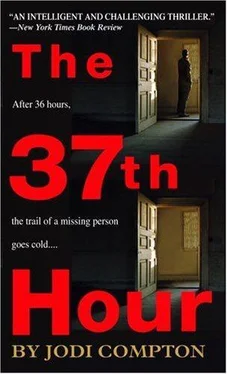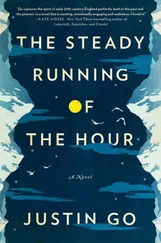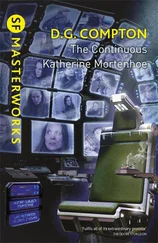Then again, Shiloh, when he was deep in thought, often had a guarded, inward expression that some people might read as anger. Maybe old Mrs. Muzio was right.
She had said she’d seen Shiloh walking. Not out running, not in somebody’s car. That squared with my theory that he’d gone out somewhere in the neighborhood on foot and not come back.
I’d done my hardest interview. It made sense to work from hardest to easiest. That made Darryl Hawkins next. I checked the time on my cell phone. Almost three o’clock; it was still too early. He and his wife wouldn’t be home from work until around five. I needed an errand to take up the interim time.
I still lacked a good picture of my husband. I had only one, and I didn’t think that Shiloh knew I had it.
Annelise Eliot had never really believed she was going to be identified and arrested after over a decade of peaceful life under an assumed name. When Shiloh finally came to her with an arrest warrant, she’d lost control. In an impulse that must have mirrored her thirteen-year-old crime, Annelise grabbed a letter opener off her desk and tried to stab him. He’d gotten a hand up in time, but she’d sliced a deep gash into his palm.
The local media hadn’t been tipped to the arrest, but they were ready the next day for the arraignment at the US courthouse in St. Paul.
The Star Tribune and the Pioneer Press had run virtually the same photo: Shiloh among a small cadre of uniformed cops, bringing Annelise Eliot in for her first court appearance, a courteous but controlling hand on her arm. The bandage on his hand, from where she’d cut him, was clearly visible.
That image was the quintessential Shiloh to me, and I’d clipped it for that reason. But it wouldn’t work to show to strangers. He’d turned his face away from the photographers, so that he was in profile.
When I got home, I picked up the phone and I dialed a number I’d come to know by heart.
When Deborah put Genevieve on the line, I said, “It’s me. I need to ask you for a strange favor.”
Silence on the other end.
“Are you there?” I asked.
“I’m here,” she said.
“At your Christmas party, Kamareia had a camera.” When the name Kamareia was hard to say, I realized I hadn’t mentioned her directly all during my visit. “She was taking a lot of photos of people, including Shiloh. I need to go to your place and get one of those pictures.”
There was another silence, but this time Genevieve broke it without prompting. “All right.”
“I need to know where they might be,” I added.
“Well,” Genevieve said slowly, “there’s a shoebox she keeps on the shelf in her closet. I’ve seen a lot of photos in there.”
“All right,” I said, “good. But your place is locked, right?”
“Mmm, yes,” Genevieve said. “But the Evanses across the street have my spare key right now.” She seemed to think again. “I’ll call and tell them you’re coming.”
“Thanks, Gen,” I said. Then I asked: “Have you spoken to Shiloh recently?”
“No,” she said. “Not for a long time.”
Time and again, on the job, we’d asked loved ones for recent photos of missing persons. It was perhaps the most crucial item in a search.
Genevieve wasn’t making the connection. She seemed to find nothing strange in the fact that I needed to go to her uninhabited, locked house in search of a recent picture of my husband.
“See you soon,” I said, which probably wasn’t true, and hung up.
The day Genevieve’s only child died, the two of us had enjoyed a particularly good day at work, a productive day. I remember that we were both in good spirits.
I’d given her a ride to work that morning, since her car was in the shop, and I was taking her home as well. Since I had to drive her there, Genevieve had said, I might as well stay for dinner. And Shiloh, we reasoned, might as well come with us. Shiloh had been buried in the analysis of evidence that back then nobody had believed was the trail of Annelise Eliot. He was reluctant to stop and go with us, but Genevieve and I had worn him down. Genevieve had been particularly winning in her pleas. She was worried about him and how hard he’d been working.
It was February, one of those days in which the Cities were swaddled in a low-hanging layer of cloud that actually made for more warmth than a bright, clear day. Earlier, fresh snow had fallen, covering up the soot-stained ridges that lined the streets from the first weeks of winter onward.
Only the last of the day’s business for Gen and me had been something of a waste of time: A missing-child report. We’d driven out to a small condominium complex in Edina to meet a young father whose six-year-old son had failed to come home on the big yellow bus.
The young man-“Call me Tom”-was a relative rarity, a divorced father who’d gotten custody of his child. “It’s been tough,” he said, leading us inside his condo, where boxes were stacked up in the living room.
“Did you just move here?” I asked him, but even as I did I sensed that these weren’t moving boxes; they were all uniform in size and shape.
“Nah,” he said. “Those are juicers. I sell them, and a herbal health and diet supplement, from here at home,” he said. “And I just got my fitness-trainer credential, so I’ve been trying to build up a clientele base. Things have been pretty hectic.”
It made sense. Tom had a compact but obviously well-built frame, and his brown gaze was intense but not personal, in the practiced way of a salesman.
Sometimes you just get the feeling, whatever the external circumstances of a disappearance, that nothing is seriously wrong. As Genevieve and I began our interviewing, I started getting that feeling right away.
Naturally, the ex-wife had been of most interest to us; abduction by noncustodial parents is far more common than stranger abduction. “Nah,” Tom said, shaking his head emphatically. “I already talked to Denise at work. Kinda freaked her out, but I told her to stay put for now, that I’d already called you guys.” He frowned. “She wouldn’t just up and take him, believe me. She can hardly be persuaded to spend enough time with Jordy as it is,” he said. “She’s got a new boyfriend, and besides, she’s an antiques freak. Half the time I pick Jordy up on Saturdays, he’s spent his day walking around behind her in stores, looking at Tiffany lampshades and delft tiles. Is that how you entertain a six-year-old?”
I didn’t know how to answer that, so I said, “What about other relatives?”
“What about them? You mean, would they take Jordy?” Tom looked puzzled. “I can’t imagine it. My family’s all in Wisconsin, and Denise’s-” He broke off. “Oh, no.”
Genevieve and I looked at each other. Eureka.
“What is it?” Gen said, cuing him.
“Oh, no,” he said again, reddening. I suspected the heat in his face wasn’t embarrassment but anger. “Hold on,” he said, jumping up and going to the phone.
Tom dialed and spoke to an unknown party on the other end. It was clear within a minute that Jordy was safe and sound. “Is he there? He is?” Tom said. “I’ll come get him.”
I looked at Genevieve and spoke quietly. “What do you think?” I asked. “Wife’s sister?”
She shook her head. “Mother-in-law. I’d almost guarantee it.”
We got most of the story in overheard, and increasingly vitriolic, sound bites.
“Well, you didn’t even tell me. God, I was worried as… No, I didn’t. I said I didn’t need you to take him for a haircut. No, I did not agree, I did not… You’re twisting what I said in order to… His hair is not… That’s how they all wear… You’re not listening!”
Читать дальше












